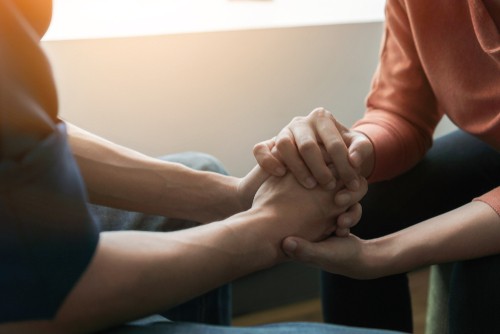Don’t Detox from Drugs of Alcohol Alone
Updated on 2/3/2023
Don’t stop drinking or using substances on your own. There can be health risks that come with your decision to stop drinking alcohol or taking drugs. Choosing to go it on your own carries with it an increased risk of adverse health outcomes. Detoxing from alcohol or drugs is the first step in addiction treatment; it’s the beginning of a lifelong commitment to being healthy. Don’t take this step by yourself.
The medical reasons why you shouldn’t detox by yourself are numerous, but the mental, physical and spiritual reasons are also compelling. You aren’t alone in your treatment for addiction. The support of family, friends and those who have gone through treatment or are in treatment create an essential support system.
Dangers of Detoxing Alone
Detoxing from drugs or alcohol can be vital to your overall treatment. Prolonged use of alcohol or substances leads your body to retaining alarming levels of toxins. Medical supervision is necessary to ensure your body withdraws from these toxins safely. Your body becomes dependent on drugs or alcohol. Whether you actively or inactively choose to discontinue drinking or use a drug, your body reacts to the loss. Any substance – it doesn’t matter if it’s marijuana, opioids, alcohol or something else – alters the cells in your brain. The cells that once responded naturally to pleasure or other emotions are changed.
Substances like alcohol or cocaine alter the response system, creating a need for the substance to signal the feeling of satisfaction. The body also becomes dependent on your preferred substance. Withdrawal of substances means you are depriving your brain and organs of something they rely on to feel good. Some of the side effects of detoxing from different substances are listed below.
Marijuana
- Irritability
- Insomnia
- Lack of appetite
- Anxiety
Prescription Opioids
- Pain in bones or muscles
- Increased energy
- Trouble sleeping
- Loose bowels
- Vomiting
- Feeling cold
- Restless legs
Alcohol
- Rapid pulse
- Elevated blood pressure
- Anxiety
- Vomiting
- Hallucinations
- Seizures
- Delirium
While you are detoxing, a doctor needs to assess any damage caused by alcohol or drugs to your heart, liver, lungs, nerves or gastrointestinal tract. During the assessment, your doctor can also determine your nutritional deficiencies, including a lack of vitamins. Some people begin to withdraw without medical help for different reasons. If you are brought to a hospital or a walk-in clinic while detoxing, inquire about transferring to a treatment center. Many treatment centers are staffed by doctors and nurses trained to handle detoxification. The medical staff at a treatment center can potentially mitigate or prevent harmful effects from alcohol or drug withdrawal.
Detox Standard of Care
Substances are unique and require specialized care when you are detoxing from one or more. Detoxification from heroin, alcohol, cocaine or prescription opioids benefits from specialized care that addresses the substance and your individual needs. When you are in detox at a treatment center, you are housed separately from those who have completed withdrawal. The withdrawal area should be quiet, relaxing and comfortable. Your care is the staff’s focus, and they are there for you around the clock. Throughout your detox treatment, you can feel scared, depressed or anxious. The trained staff can explain what is happening to you in an honest, supportive manner. Comfortable detox is possible and includes proper nutrition, a serene environment and a professional, caring medical staff.
Post-Detox Care
Detox is the beginning of your treatment journey. Your body needs to free itself of what hurt it; the next step is holistic healing. After your body is free from the dangerous chemicals it accumulated from alcohol or drugs, it is time to enter the next treatment phase. In-patient therapy conducted in a quiet, safe, comfortable environment is optimal for your treatment.
Comprehensive or holistic modalities can bolster your treatment and help you maintain your recovery. Therapies like individual or group, yoga, meditation, journaling or resting are beneficial to you. You can relax and discover your personal needs for a successful recovery while experiencing different modes of healing. You can master breathing techniques, recognize how your body reacts to yoga positions or sit and watch nature. Treatment tailored to allow your personal needs is essential.
After treatment, care is another part of your treatment and recovery journey. Before you finish treatment, you can discuss a treatment plan for when you leave the treatment center. A sober living house can aid in maintaining your sobriety. You can also go home. You aren’t alone after you finish treatment. Your therapist, groups and a positive support system are crucial. Talk with your therapist about any fears or anxiety you can experience about completing treatment. Transitioning into recovery is not the end.
Detox and treatment bring you back to loving and respecting yourself. Finding a treatment center that recognizes you as a whole is vital. You deserve a quiet, safe and comfortable detox and therapy experience.
Detoxification from alcohol or drugs is the first step in addiction treatment. Detoxing properly requires special care from trained staff. There’s no need for discomfort during the detox process. Your detox care team understands the need for individual attention while your body rids itself of substances and toxins. Once the toxins have left your body, you can begin to heal your mind, body and spirit. Cliffside Malibu is set in between the Santa Monica mountains and the Pacific Ocean. We provide luxurious, safe, individualized care while you are going through treatment. Our trained staff recognize you as a whole person, deserving to heal from addiction. Contact us today: (855) 403-5641.
